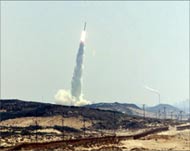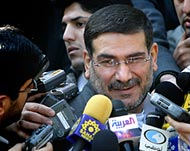Why shouldn’t Iran go nuclear?
As Washington funds a new generation of atomic bombs and argues the case for regime change in Iran, analysts say nuclear weapons must be an attractive option for the Islamic Republic to deter possible invasion.

A senior fellow at the UK’s Royal Institute for International Studies, Dr Ali Ansari, adds that with the US military camped out on two of Iran’s borders, “there is no logical reason” why it should not opt to create the ultimate deterrent.
Speaking to Aljazeera.net on Wednesday, Ansari said: “There is only a legal reason not to go nuclear – the Non-Proliferation Treaty (NPT).
“But the NPT is completely out of touch with reality and Iran may be close to opting out of it anyway.”
Many commentators remark that the NPT is an anachronism that makes the role of the International Atomic Energy Agency (IAEA) contradictory if not impossible.
IAEA: Mission impossible?
Not only does the IAEA have a mandate to assist “the supplying of materials, equipment or facilities” to non-nuclear states that sign the NPT treaty, but it should also train nuclear scientists and “foster the exchange of scientific and technical information”, according to its own statutes.
At the same time the IAEA gives NPT signatories – such as Iran – the materials and expertise needed to use nuclear power, it must also prevent the very same from being used for nuclear weapons.
|
“If the case [for the US] to retain nuclear weapons is persuasive … it should be even more persuasive for those countries that live in insecure neighbourhoods and lack the panoply of conventional military tools” |
IAEA spokesman Melissa Flemming told Aljazeera.net on Tuesday that until the UN resolution on 18 September, Tehran had had every right to process uranium.
She added Iran was entitled to expect cooperation from nuclear powers such as Russia and the United States even though it does not take much to strip the technologies of their civil uses and produce weapons.
And today’s bombs are far more powerful than the two that flattened Hiroshima and Nagasaki and killed hundreds of thousands of people more than 50 years ago.
Reason to arm
But with no clear international consensus on who has the right to nuclear technologies and who does not, Iran has very practical reasons to arm itself as quickly as possible.
Threats to security do not just come from the US and the instability created in Afghanistan and Iraq following their invasions.
Non-NPT signatory Israel has a nuclear arsenal capable of wiping Iran off the map. And if Tel Aviv needs its nuclear deterrent, despite the protection it is afforded by the US taxpayer, Iran must have a legitimate case too.
 |
|
An Israeli rocket launches near |
On Wednesday, Tel Aviv said it was buying 500 “bunker-buster” bombs from Washington after the US elections in November.
Israel’s Haretz newspaper also quoted an official on Wednesday who said these bombs were not “for the Palestinian front” but for possible use in Iran.
Concerned over a perceived threat to its nuclear facilities, Tehran used a military parade marking the Iran-Iraq war to send its own message to Israel.
Slogans draped over its ballistic missiles read “America will be crushed under our feet” and “Israel will be wiped out”.
Poor leadership responsible
Dr Ansari claims the current tension is the result of poor “adolescent-like” leadership and says the current I’ve-got-a-bigger-weapon-than-you strategy could lead to disaster.
“I believe Iran is calculating that the US will not invade and risk an escalation of the situations in Afghanistan, Iraq and a probable general Middle Eastern war that would include Israel.
|
“I don’t think the Israeli government or the neo-conservative elements in the US are averse to a general Middle East war as it will provide an opportunity to … reshape the region in their own image” |
“The problem is that this is a miscalculation. I don’t think the Israeli government or the neo-conservative elements in the US are averse to a general Middle East war as it will provide an opportunity to shake up and reshape the region in their own image.”
A reader in history at St Andrew’s University in Scotland, Ansari concludes that it is likely the US will continue to seek a scapegoat for the chaos in Iraq and may push for war in Iran.
“At first it used to be ‘Old Europe’ that was to blame, but increasingly we are seeing Iran named as the force that prevents the American army from stamping out resistance to its invasion.”
Morality
So why should Iran not have nuclear weapons?
According to the deputy director for non-proliferation at the US Carnegie Endowment for International Peace, Jon Wolfsthal, there are two reasons.
He told Aljazeera.net that even if nuclear weapons seem a good option for Iran in the face of US and Israeli politics, it may push other countries in the Middle East to go nuclear too.
 |
|
Defence Minister Ali Shamkhani |
“We could be looking at a situation where Saudi Arabia, Egypt and eventually Iraq may decide to follow suit – and that will not be in Iran’s best interests in the long term – just as I argue that nuclear weapons are not in Israel’s best interests.
“Moreover, Iran signed the NPT and has made a commitment to use nuclear technology for peaceful purposes while holding back on 20 years of secret research.
“It is making a mockery of an international institution – the only body that can deal with nuclear security issues on a systematic basis,” Wolfsthal said.
No guilt
But Iraq’s invasion, which UN Secretary General Kofi Annan agreed was illegal in a 16 September interview, may erase any feelings of guilt in Tehran at misleading the international community.
The senior vice-rector at the United Nations University in Tokyo, Ramesh Thakur, argued an occupied Iraq had heightened fears for national security by such “contemptuous flouting of normative and legal restraints on war”.
|
“Saudi Arabia, Egypt and eventually Iraq may decide to follow suit [to develop nuclear weapons] … that will not be in Iran’s best interests in the long term” Jon Wolfsthal, |
He also asked how the international community could convince nations of the futility of nuclear weapons when “all who have such weapons prove their continuing utility” and insist on keeping them.
“The preaching of exhortations and the coercion of sanctions need to be buttressed with the force of example.
“If the case to retain nuclear weapons is persuasive … it should be even more persuasive for those countries that live in insecure neighbourhoods and lack the panoply of conventional military tools,” he said.
Talking progress
Describing the NPT as a “frozen international power structure decades out of date”, Thakur said the only way to deal with Iran was to work towards the removal of all nuclear weapons.
There needs to be “further constraints on the extra-territorial deployment of nuclear weapons, the entry into force of the Comprehensive Test Ban Treaty and a ban on missile test flights and on the production of fissile materials.
“Such scenarios typically provoked dismissive comments from so-called ‘realists’. Realistically speaking, is there another option beyond those identified here?”